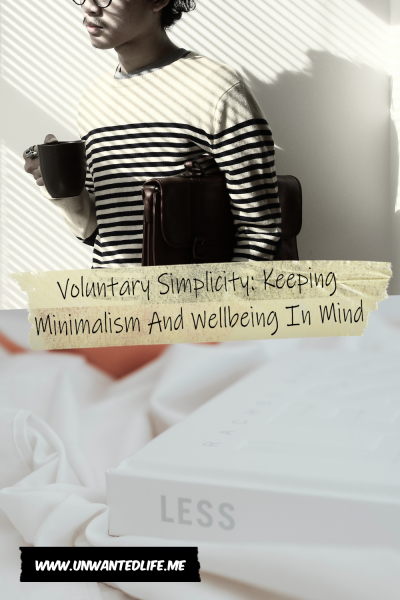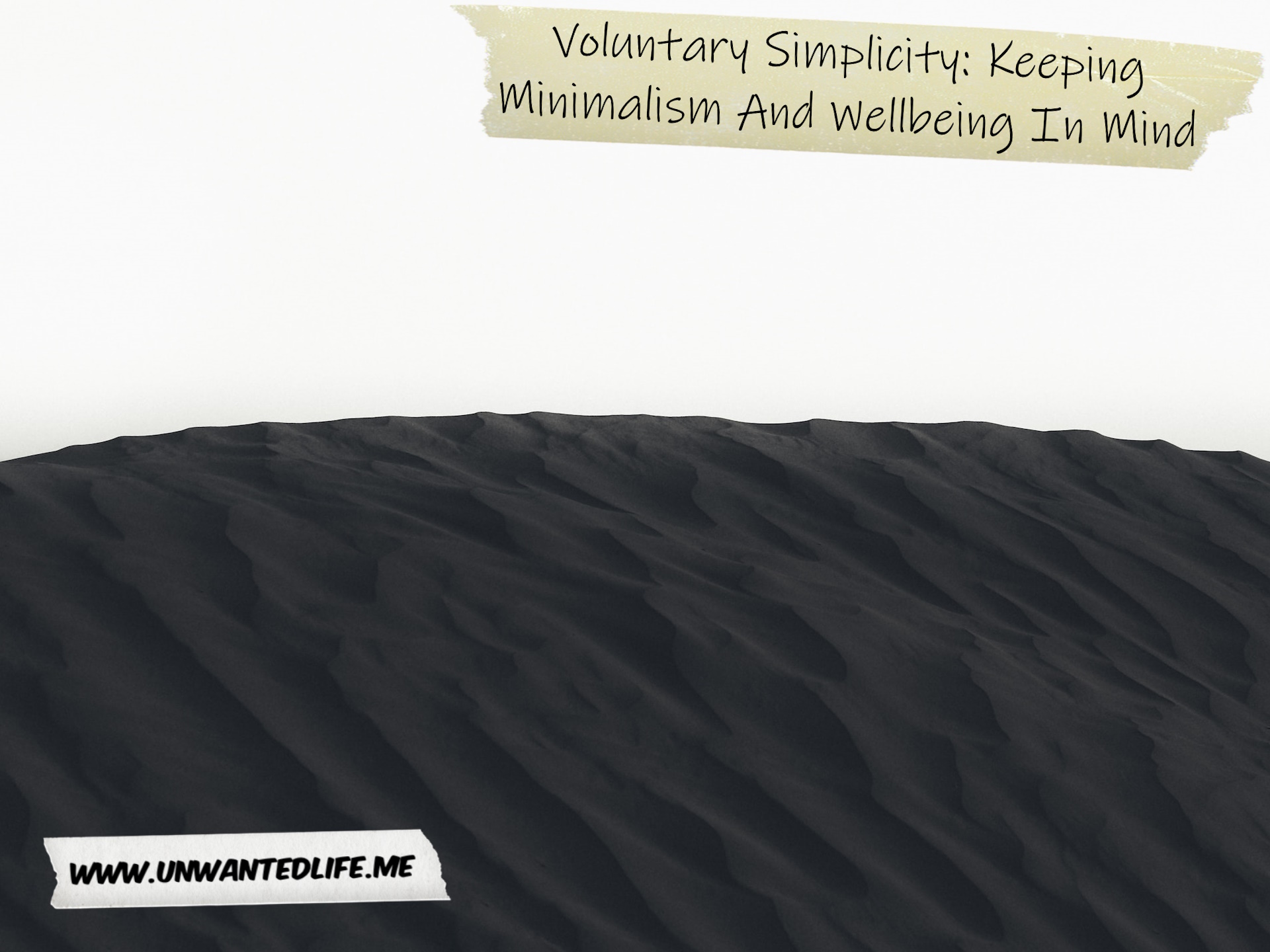The notion that ‘money can’t buy you happiness’ is a lie told by people where money isn’t an issue. The fact is that money issues are a cause of the vast majority of people’s problems. The same notion needs to be applied to minimalism. There is a difference between voluntary simplicity and minimalism and simplicity and minimalism where you don’t have a choice.
What Is Voluntary Simplicity
Voluntary simplicity (also referred to as minimalism) involves a deliberate lifestyle choice that is focused on reducing consumption and the excess in one’s life so that people can focus on prioritising their values (Hook, Hodge, Zhang, Van Tongeren, and Davis, 2023). This view on life has also become a movement, known as the Voluntary Simplicity Movement, whereby people seek a higher quality of life through lower consumption (Alexander and Ussher, 2012).
The low-consumption lifestyles that many voluntary simplicity bring have surged in popularity as people attempt to compensate for the harm consumerism causes the environment, which they find has caused lower levels of personal wellbeing (Lloyd and Pennington, 2020).
How To Tap Into Voluntary Simplicity
Connect with nature
Spend time outdoors disconnecting from technology and connecting with the green spaces around us, and engage nature, which has been proven to benefit our mental wellbeing.
Unplug from the rushed pace of modern demands, a bit like those who engage in bed rotting, but make time to think, wander, and wonder without constant pressure. Let insights emerge.
Cherish relationships
Streamline social circles and commitments to invest in meaningful bonds with caring people who nourish you for you. Quality over quantity.
Focus on personal growth
Escape surface-level busyness by going deeper. Think critically, ask big questions, and expand awareness through contemplation, reading, and classes. You’re never too old to take up a new hobby.
Appreciate simplicity
The simplest yet greatest joys of life – love, laughter, learning, and purpose – are free. Train your attention to recognise and savour simple pleasures. Little moments of joy can have a big effect on our wellbeing.
Environmental impact
Although it can be hard, there are many ways to help reduce your impact on the environment, from taking reusable bags when you go shopping to not leaving your electrical items on standby.
The Benefits Of A Voluntary Simplicity Lifestyle
For some, wellbeing and voluntary simplicity are closely intertwined. Thus, embracing simplicity can lead to a more fulfilling and balanced life, enhancing overall wellbeing.
More fulfilment
According to Psychologs, simplifying our lives can lead to a greater sense of fulfilment, which can come in many forms, in our jobs, relationships, hobbies, etc. Living a minimalist life can help us become more engaged and hopeful while offering freedom to explore life’s wonders. They further claim that research shows that when we prioritise minimalism, we have more room for meaningful relationships and fulfilled and happier lives.
Wellbeing
A qualitative study by Lloyd and Pennington (2020) with 10 participants sought to investigate those who identify as minimalists or living such a lifestyle through the use of semi-structured interviews. The study found that people living these kinds of lifestyles have a higher level of personal wellbeing. However, this is only true when living a minimalist lifestyle is a choice.
Studies into minimalism and the voluntary simplicity lifestyle have got me wondering how people’s wellbeing was affected when they tried living such a lifestyle but gave up.
This is why living in shared accommodation and rooms that are barely bigger than our beds is making people unhappy, especially young people. Because we’re forced into living a minimalistic lifestyle against our will. My entire adult life of 20+ years has been spent in forced minimalism, but recently I’ve been able to buy art to display for the first time, and I love it.
Enhanced focus and clarity
With less clutter and distractions, you can focus more effectively on the things that truly matter. Voluntary simplicity allows you to prioritise tasks and experience greater clarity of thought. That’s because, when we’re able to think clearer, we can experience increased focus on what truly matters, leading to better decision-making and improved mental wellbeing.
Improved health
Embracing a simpler lifestyle often involves healthier habits like mindful eating, regular exercise, and sufficient rest, contributing to improved physical wellbeing.
Reduced stress and anxiety
Voluntary simplicity encourages the decluttering of physical spaces and mental clutter, leading to a more peaceful and organised mind. Eliminating distractions and unnecessary obligations by managing time effectively and minimising commitments can create a calmer environment for yourself, reducing stress and anxiety. In short, it’ll help lead to fewer experiences of stress and anxiety (Lloyd and Pennington, 2020).
Increased mindfulness and gratitude
Voluntary simplicity encourages you to appreciate the present moment and the simple things in life. And self-care is all about that kind of mindfulness of being present in the moment. By reducing the pursuit of material possessions and external validation, you cultivate mindfulness and gratitude for what you already have.

Strengthened relationships
Voluntary simplicity allows you to dedicate more time and energy to meaningful connections with loved ones. By freeing up your time and attention, you can foster deeper bonds and nurture your relationships. Therefore, you’ll be able to improve your social wellbeing and your social support network.
Increased happiness
Letting go of unnecessary complexities can lead to increased contentment and a greater sense of fulfilment. Given that happiness isn’t a choice, but rather a result of the actions and intentions, then this would make sense.
Greater sense of purpose
Voluntary simplicity helps you identify what truly matters to you, aligning your actions with your values and goals. This clarity of purpose leads to a greater sense of meaning and fulfilment in life.
Reduced environmental impact
One of the benefits to the environment of voluntary simplicity is how it encourages conscious consumption and mindful living, reducing your environmental footprint. By minimising waste and unnecessary consumption, you contribute to a more sustainable future.
Enhanced creativity and innovation
Voluntary simplicity creates space for creativity to flourish. By removing distractions and unnecessary expectations, you allow your mind to wander, explore, and generate new ideas.
Increased self-awareness
By stripping away external pressures and distractions, you gain a deeper understanding of your own needs, desires, and values. Thus, voluntary simplicity encourages introspection and self-reflection.
Greater sense of freedom and autonomy
By embracing a minimalist lifestyle, you gain control over your time, energy, and resources. Living a voluntary simplicity lifestyle should help liberate you from the burden of excessive possessions and societal expectations.
Cut out excess
Living a voluntary simplicity lifestyle will help eliminate nonessential possessions, activities, habits (see stop-doing list) and thoughts that trigger stress. By avoiding overconsumption, you can discern your true needs from your desires, freeing up energy.
Enhanced emotional wellbeing
Voluntary simplicity fosters a sense of peace, contentment, and gratitude. By reducing stress, anxiety, and distractions, you create a more positive and emotionally balanced state of being.
Summary
Incorporating voluntary simplicity into your life can be a gradual process. Start by decluttering your physical spaces, eliminating unnecessary commitments, and prioritising activities that bring you joy and fulfilment. As you embrace simplicity, you’ll experience its positive impact on your wellbeing, leading to a more fulfilling and meaningful life.
Cultivating voluntary simplicity involves mindful choices, setting boundaries, prioritising what’s essential, and finding joy in the present moment. It’s a powerful practice that can positively impact various dimensions of your wellbeing.
As always, leave your feedback in the comments section below. Also, please share your experiences with voluntary simplicity and minimalism in the comments section below as well. Don’t forget, if you want to stay up-to-date with my blog, then sign up for my newsletter below. Alternatively, click the red bell icon in the bottom right corner to get push notifications for new articles.
Lastly, if you’d like to support my blog, then there are PayPal and Ko-fi donation payment options below. Until next time, Unwanted Life readers.
References
Alexander, S., & Ussher, S. (2012). The voluntary simplicity movement: A multi-national survey analysis in theoretical context. Journal of Consumer Culture, 12(1), 66-86. Retrieved from https://simplicityinstitute.org/wp-content/uploads/2011/04/The-Voluntary-Simplicity-Movement.pdf.
Hook, J. N., Hodge, A. S., Zhang, H., Van Tongeren, D. R., & Davis, D. E. (2023). Minimalism, voluntary simplicity, and well-being: A systematic review of the empirical literature. The Journal of Positive Psychology, 18(1), 130-141. Retrieved from https://www.tandfonline.com/doi/abs/10.1080/17439760.2021.1991450.
Lloyd, K., & Pennington, W. (2020). Towards a theory of minimalism and wellbeing. International Journal of Applied Positive Psychology, 5, 121-136. Retrieved https://roomtothink.net/wp-content/uploads/2020/10/Lloyd_et_al-2020-International_Journal_of_Applied_Positive_Psychology-2.pdf.


Nice 👌
Very thought provoking piece! For me, I came to voluntary simplicity from the environmental angle. The more I sought to reduce waste and be kind to the Earth, the more I realized I had accumulated so much unnecessary stuff over a lifetime. Now I’m decluttering so my daughters don’t have to deal with my crap one day when I’m gone.
I hope you’re able to generate a nice little income from the stuff you declutter. Happy New Year
I love the idea of voluntary simplicity. I believe happiness is the way to a more fulfilling life and not the destination, and it can be found by embracing simplicity and cultivating your wellbeing. Thanks for sharing this article.
Thanks for commenting
As the saying goes, it’s the journey, not the destination. Thanks for commenting
As the world seems to speed up with the integration of advanced tech like automation in everything, somehow I am even more attracted towards slowness and steadiness. I am not sure how to interpret my feelings but it seems a good idea to embrace simplicity and minimalism. I like to talk to people in-person instead of typing chats on the phone. I like long walks in nature instead of traveling in a car. Am I getting old?
By the way, Happy New Year to you.🎉 May this year bring even more success and happiness into your life.
Happy New Year to you too. I don’t think liking those things means you’re getting old, but they’ll certainly do more for your wellbeing. Thanks for commenting
Ok, I know it as minimalism with the term and my whole life is always being that way. Very interesting post and sharing about it.
Thanks for commenting
Such a well written post! I definitely believe that living more simple life comes with many health benefits that some of us don’t even realise
Thank you and thank you for commenting
Nice article.